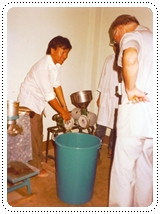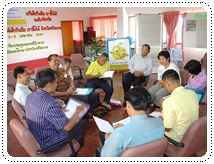Research Profile
History and Background
First Decade (1977-1986)
Bladder Stone


Nutrition Health and Human Resources in Village Level Project (Nong Hai Project)
Development of Complementary Food for Communities

An appropriate measures for solving the nutrition problems of mothers and children living in rural communities were developed through the collaboration of four main agencies: the Ministry of Public Health, the Ministry of Agriculture and Cooperatives, the Ministry of Education, and the Ministry of the Interior. The project resulted in sustainable community development and has been used as a model for other villages throughout the country.
Eating habits of the Thai people
Eating cultures and beliefs were studied in order to develop healthy consumption habits and improve the quality of life of the Thai people. Through cooperating with academics in the region, we gained a better understanding of the causes of prevailing food beliefs and could then efficiently correct improper eating habits.
Anemia in pregnant women
Iron supplementation at 120 mg/day during the middle period of pregnancy could prevent anemia in pregnant women. This successful program’s goals were achieved through nutrition education with the cooperation and assistance of village health volunteers.
Second decade (1987-1996)
Food fortification and nutrient bioavailability


Food product development to solve the overnutrition problem and its effect on the body
Food safety
Nutrition labeling preparation


Database of nutritional values of Thai foods

Communication for nutrition development and promotion

Third decade (1997-2006)
Application of a multidisciplinary approach in solving Thailand’s “double burden” was used and demonstrated through many in-depth research studies.
Evaluation of nutritional status

Thai food research

Communication and nutrition habit improvement among children and teenagers

Proactive food and nutrition

Current research studies
As always, the Institute cooperates with government and private sectors to undertake research studies on food and nutrition security within the food chain, paying special attention to food quality, nutritive values, food safety and food/nutrition education. Our research studies respond to government policy to solve the prevailing national food and nutrition problems in order to improve the quality of life of our population and to promote the nation’s food exports.



Current research studies are categorized into five main groups, namely:
- Thai food/health food,
- Nutritious food product development,
- Food safety, toxicology and safety management systems,
- Nutrition and Dietetics for combating malnutrition’s Double Burden, and
- Lifestyle, behavior and communication related to nutrition.
- Thai food/health food,

